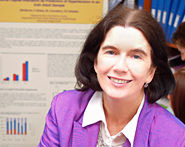Posted: 07 March 2006
Irish women are more likely to die of cancer than their European counterparts, says new report by Women’s Health Council
Cancer is now the second most common cause of death for women in Ireland, according to a recent report released by the Women’s Health Council (in conjunction with the National Cancer Registry); approximately 3,500 women in Ireland die from the disease each year. Death rates from cancer among Irish women are higher than those recorded in other western European countries, except for Denmark.
The report, Women and Cancer in Ireland 1994-2001, also found that the incidence of cancer in women has risen by more than 25% in the last 22 years. In 1994, 5,848 women were diagnosed with cancer; in 2006, that figure is expected to rise to 7,400, according to Dr Harry Comber, Director of the National Cancer Registry.
The co-author of the report, the Women’s Health Council, is a statutory body that was set up in 1997 to advise the Minister for Health and Children on all aspects of women’s health. Recently, three UCD academics were reappointed to the board of the council. The appointments, made by the Minister for Health, Mary Harney, TD, are based on bringing a balance of expertise to the board and it is in this capacity that the three UCD academics have been called back.
Professor Cecily Kelleher, Professor of Public Health Medicine and Head of UCD School of Public Health and Population Science, now in her third session as Chair of the Council, is a long-standing government adviser in the area of women’s studies. She has expertise in large-scale population survey research and investigation into women’s health.

Professor Cecily Kelleher, Professor of Public Health Medicine and Head of UCD School of Public Health and Population Science
Professor Kathleen Lynch, Professor of Equality Studies and Director of the UCD Equality Studies Centre, is taking up her second term on the Council and brings to it an expertise in equality issues. Her knowledge of women’s issues comes from a social science perspective. She was a member of the Constitutional Review Group 1995/96 and has a proven track record of contributing to public debate.
Dr Patricia Fitzpatrick, Senior Lecturer in the UCD School of Public Health and Population Science, is beginning her second term on the board of the Council but was a member of its research committee prior to her appointment on the board. Her areas of expertise are overall scientific evaluation of reports, and cancer and health services research. She has been involved in several Department of Health screening programmes, including the 2005 evaluation of Irish cervical screening. She is also an epidemiologist with Breastcheck.
The three UCD academics are among 6 reappointed members of the board and 10 new members.
After the appointments Ms Geraldine Luddy, Director of the Women’s Health Council, said "On behalf of the Women's Health Council, I warmly welcome the 10 new members of the Council and the reappointment of the six existing members. I am particularly pleased with the reappointment of Professor Cecily Kelleher as Chair of the Council. I look forward to working with her and the rest of the new board over the coming three years.”
Women and Cancer in Ireland 1994-2001: other findings
An estimated 80,000 women are living with cancer in Ireland, twice as many as the number of male cancer survivors.
Older women are much less likely to receive treatment for cancer than younger women.
There are differences in the likelihood and treatment for cancer across different socio-economic groups, according to the report. Incidence rates of cancers of the lung, cervix, pancreas and stomach are higher for women resident in the more deprived areas than for those in affluent areas. Incidence rates of breast cancer and melanoma of the skin are higher in women in affluent areas.
For most cancers, relatively small proportions of women are diagnosed at an early stage of the disease. Stage is one of the most important determinations of survival.
In 2002, a substantial proportion of the Irish population (of both sexes) was not heeding the advice of the European Code Against Cancer, which recommends adopting a healthy lifestyle to reduce the risk of cancer.
